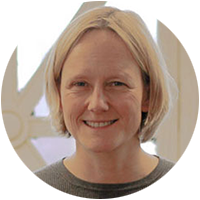Christina Ellervik, MD, PhD | Master of Medical Sciences in Clinical Investigation
 Christina Ellervik, MD, PhD, is a board-certified clinical biochemist from Denmark and an Associate Professor at the University of Copenhagen. Currently, she is a Visiting Scientist at Boston Children’s Hospital and Department of Preventive Medicine, Brigham and Women’s Hospital, Boston, MA, USA. She is the Founder of the Danish General Suburban Population Study (N=21,000) with 200,000 biospecimens and Co-editor for the journal Clinical Chemistry. She has supervised several MD students for their PhD and Master’s Degree in Clinical Biochemistry.
Christina Ellervik, MD, PhD, is a board-certified clinical biochemist from Denmark and an Associate Professor at the University of Copenhagen. Currently, she is a Visiting Scientist at Boston Children’s Hospital and Department of Preventive Medicine, Brigham and Women’s Hospital, Boston, MA, USA. She is the Founder of the Danish General Suburban Population Study (N=21,000) with 200,000 biospecimens and Co-editor for the journal Clinical Chemistry. She has supervised several MD students for their PhD and Master’s Degree in Clinical Biochemistry.
What is your research background?
My background mostly consists of observational genetic studies using cohorts from large general population studies in Denmark. The cool thing about Denmark is that we have public registries of information that are separate from any healthcare or insurance system. This allows us to create large cohorts of 100,000 individuals that resemble the general population.
Currently, I work in the field of genetic epidemiology, where we look at different pathways from genes through different biochemical measures of disease.
You have an MD and a PhD, why would you add a Master’s Degree?
Both my MD and PhD are in biochemistry and genetics, and although I’ve written a lot of articles on genetic epidemiology, no one really recognizes that I have a background there as well. Since I've done research in genetic epidemiology for 10 or 12 years, I would like a degree that proves that it’s something I actually know. I made a lot of considerations before I submitted my application, but now I’m not sure how I could have done without the Master’s course.
What are some of the highlights of the program?
One of the highlights is the focus on biostatistics, which is a substantial part of year one. It’s not just long lectures with a lot of formulas where you leave saying ‘how can I actually use that?’ It’s very hands-on and taught, unlike any course I’ve tried before.
The biostats modules are primarily led by Brian Healy, who is brilliant at taking very complex concepts, formulas, and scripts and breaking them down to their essence. The benefit of Brian’s approach is that you can directly implement it. I’m already using several of his ideas and scripts in my mentored research project.
It’s also been quite motivating to hear from researchers outside of the Harvard system. We’ve had a couple lecturers from the biotech and pharmaceutical industries, which allowed us to see how the same statistical methods can be implemented a number of different ways depending on your aims and perspective.
How do you think the MMSCI program will impact your career?
The course has already improved my writing, script skills, and understanding of applicability. I think one of the great things about this program is that it’s not focused on a disease, or genetics, it’s very methodological, rigorously so. It doesn’t matter what you’re investigating or what exposures you’re looking for because we all have to use the same rigorous methodology. That’s what makes good researchers.
Learn more about the Master of Medical Sciences in Clinical Investigation program.
Written by Chike Lawrence-Mitchell